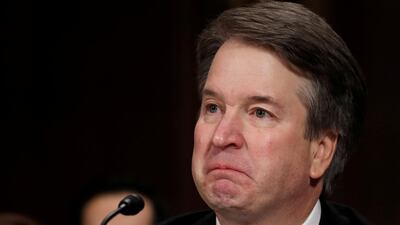Donald Trump's embattled Supreme Court nominee and his team messaged friends to refute allegations he exposed himself to a woman, before the claims were published, US media reported on Tuesday.
In sworn testimony to the Senate judiciary committee last month, Brett Kavanaugh said he had never discussed or heard about the allegations before they were published in The New Yorker.
The messages, obtained by NBC News, are the latest details to emerge as Democrats raise questions about his credibility and the FBI interviews witnesses about accusations made by three women.
Mr Kavanaugh's fate now rests with a handful of senators who must decide whether he is suitable to sit on the land's highest court, in a vote expected later this week.
Mr Kavanaugh has strongly denied any misconduct.
Deborah Ramirez was the second woman to come forward when she told The New Yorker that Mr Kavanaugh had exposed himself to her during a drunken party at Yale University when they were freshmen in the mid-1980s.
Kerry Berchem, who was at Yale with both Mr Kavanaugh and his accuser, told NBC she was asked by the nominee to go on the record in his defence.
Two other messages show communications between the judge’s team and former classmates in advance of the story.
She said she had tried to get those messages to the FBI, which re-opened its background investigation last week, but had not yet had a response.
Her account will provoke fresh questions about whether Mr Kavanaugh told the truth during his confirmation hearings.
Two days after The New Yorker account was published, senators asked whether since graduating he had "ever discussed or heard discussion about the incident matching the description given by Ms Ramirez to The New Yorker?"
“No,” he replied, before going on to claim that it was Ms Ramirez who was guilty of a behind-the-scenes campaign.
“When someone is calling around to try to refresh other people? Is that what’s going on? What’s going on with that? That doesn’t sound — that doesn’t sound — good to me,” he said, according to publicly available transcript.
“It doesn’t sound fair. It doesn’t sound proper. It sounds like an orchestrated hit to take me out.”
_______________
Read more:
Cosby conviction and Kavanaugh revelations inspire protests in US
Kavanaugh, Ford agree to testify on Thursday
The Supreme Court controversy is testing the raison d'etre of Trump's presidency
_______________
Many Democrats have opposed Mr Kavanaugh since Mr Trump announced his nomination in July, fearful that he would tilt the Supreme Court to the right for a generation.
They have seized on his angry performance before senators last week – when he said he was the victim of a "calculated and orchestrated political hit” motivated by Hillary Clinton’s loss in the 2016 election – to suggest that he would not be an impartial figure.
Critics are also picking over his statement that although he enjoyed beer he never suffered any memory loss as a result.
Chuck Schumer, the Senate Democratic leader, accused the nominee of delivering a “partisan screed” during the hearing, and of misleading senators about everything from the “momentous to the mundane”.
“The harsh fact of the matter is that we have mounting evidence that Judge Kavanaugh is just not credible,” he said.
On Sunday night, a college friend released a statement saying the nominee had mischaracterised his drinking, which had been heavy and frequently caused him to stagger and slur his words.
“When Brett got drunk, he was often belligerent and aggressive,” said Chad Ludington.
Meanwhile, it has emerged that Mr Kavanaugh will not teach at Harvard Law School in the winter, where he has taught for the past 10 years.
“Today, Judge Kavanaugh indicated that he can no longer commit to teaching his course in January Term 2019, so the course will not be offered,” the law school wrote to students.

